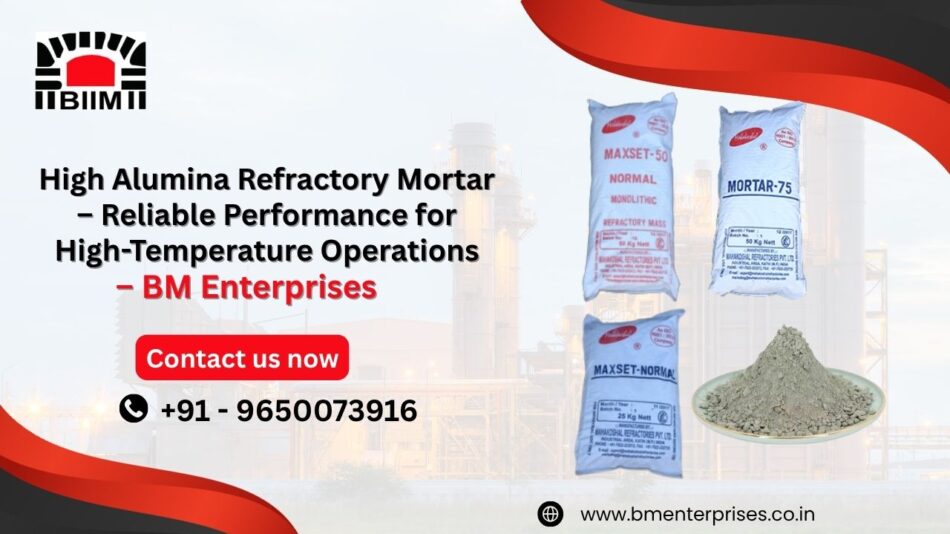High-temperature refractory bricks are laid and repaired using High Alumina Refractory Mortar, a specifically made bonding material. It is essential in industries that require strong bonding, durability, and heat resistance. Premium-grade high-alumina refractory mortars from BM Enterprises, a leading refractory producer and supplier, ensure enduring furnace and kiln performance.
Understanding High Alumina Refractory Mortar
High-grade alumina, fire clay, and bonding agents comprise this mortar, enhancing its resistance to high temperatures. High alumina cement mortar is perfect for industrial furnaces, kilns, and boilers because it has superior resistance to slag, alkali, and thermal shock compared to regular fire clay mortar.
Key Features of High Alumina Refractory Mortar
- High Bonding Strength: Provides a solid joint between refractory bricks.
- Excellent Thermal Resistance: Can withstand temperatures up to 1700°C.
- Easy Application: Ready-to-use mixture requiring minimal preparation.
- Durability: Performs effectively under harsh industrial conditions.
Types of High Alumina Mortar Available
BM Enterprises manufactures a complete range of mortars tailored for various temperature needs:
Mortar 50
Suitable for moderate-temperature applications like boilers and small furnaces.
Mortar 70
Best for medium to high-temperature furnaces, offering superior bonding and thermal stability.
Mortar 80
High-alumina grade designed for heavy-duty furnaces and industrial kilns.
Mortar 90K
A premium-grade mortar with exceptional alumina content, capable of handling extreme heat conditions and corrosive environments.
Applications of High Alumina Refractory Mortar
These mortars are widely used in:
- Steel and Iron Industries for blast furnaces and ladles
- Cement Plants in rotary kilns and preheaters
- Power Plants in boilers and incinerators
- Glass and Ceramic Factories for melting units
- Petrochemical Units for reactors and reformers
Difference Between Fire Clay Mortar and High Alumina Mortar
High alumina mortar has superior strength, corrosion resistance, and temperature endurance, making it perfect for high-heat applications, whereas fire clay mortar has a lower alumina concentration and is appropriate for regions with moderate heat.
High Alumina Cement Mortar vs Fire Clay Cement
For increased heat and corrosion resistance, high alumina cement mortar is made with a higher alumina ratio (50–90%). Conversely, fire clay cement is less expensive but better suited for milder applications with temperatures below 1350°C.
Product Features by BM Enterprises
BM Enterprises ensures:
- Consistent product quality
- Custom compositions (Mortar 50, 70, 80, 90K)
- Strict quality testing for each batch
- Reliable supply and customer support
Benefits of Using BM Enterprises’ Refractory Mortars
- Extends furnace life
- Reduces downtime and repair costs
- Ensures strong joints with minimal cracking
- Improves thermal efficiency and productivity
How to Use High Alumina Refractory Mortar
- Mixing: Add water (as per recommendation) and stir to a smooth paste.
- Application: Apply evenly on clean brick surfaces.
- Curing: Allow sufficient drying before heating.
- Storage: Store in dry conditions away from moisture.
Technical Specifications
- Alumina Content: 50–90% depending on grade
- Temperature Range: Up to 1700°C
- Shelf Life: 12 months (unopened)
- Packaging: Available in 25/50 kg bags
Why Choose BM Enterprises
BM Enterprises, an internationally recognized manufacturer and distributor of refractory mortar, provides high-quality materials that are relied upon by Indian businesses. They are the go-to option for refractory solutions because of their knowledge, dedication to quality, and customer service.
Maintenance Tips for Refractory Linings
- Regularly inspect joints for cracks
- Reapply mortar when erosion is visible
- Maintain a controlled heating cycle for longevity
Sustainability and Eco-Friendliness
Eco-friendly production techniques are the main emphasis of BM Enterprises. Their refractory mortars are made to minimize waste after application, are non-toxic, and emit few emissions.
Conclusion
For businesses that operate at high temperatures, high-alumina refractory mortar is an essential component. BM Enterprises guarantees unparalleled performance, durability, and cost-effectiveness with grades including Mortar 50, Mortar 70, Mortar 80, and Mortar 90K. Selecting BM Enterprises is a decision based on dependability, consistency, and excellent quality.
FAQs
1. What is the shelf life of refractory mortar?
Ans: The typical shelf life is around 12 months if stored in a dry, moisture-free environment.
2. Can high-alumina mortar be used with fire bricks?
Ans: Yes, it is designed for bonding all types of refractory bricks, including fire clay and high alumina bricks.
3. How much temperature can Mortar 90K withstand?
Ans: Mortar 90K can resist temperatures up to 1700°C, making it suitable for extreme furnace conditions.
4. Is it suitable for domestic ovens or only for industries?
Ans: High alumina mortars are primarily designed for industrial applications but can be used in high-temperature domestic setups if needed.
5. Why choose BM Enterprises for refractory materials?
Ans: BM Enterprises is a trusted manufacturer with years of experience, offering high-quality refractory products and excellent technical support.
 WhatsApp Us Now
WhatsApp Us Now




